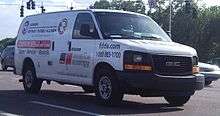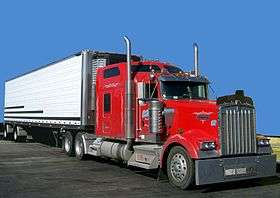Detroit Diesel
| Subsidiary | |
| Industry | Automotive |
| Predecessor | General Motors Detroit Diesel-Allison Division |
| Founded | 1938 |
| Headquarters | Detroit, Michigan, United States |
| Products | Heavy-duty diesel engines |
| Owner | Daimler AG |
Number of employees | 2,300 |
| Parent | Daimler Trucks North America |
| Website | demanddetroit.com |
Detroit Diesel Corporation (DDC) is an American diesel engine manufacturer headquartered in Detroit, Michigan, United States and a subsidiary of Daimler Trucks North America, itself a wholly owned subsidiary of the German Daimler AG. The company manufactures heavy-duty engines and chassis components for the on-highway and vocational commercial truck markets. Detroit Diesel has built more than 5 million engines since 1938, more than 1 million of which are still in operation worldwide. Detroit Diesel’s product line includes engines, axles, transmissions, and Virtual Technician.
Detroit engines, transmissions, and axles are used in several models of truck manufactured by Daimler Trucks North America.
Divisions
Detroit Diesel consists of two divisions. The off-highway division, which is owned by Tognum, is a wholly owned subsidiary of Engine Holding GmbH, a joint venture of Daimler AG and Rolls-Royce Group plc. The on-highway division is owned by Daimler AG.
Detroit Diesel Corporation timeline
- April 1938: General Motors formed the General Motors Diesel Division, the origin of today’s Detroit Diesel Corporation. The first model was the Series 71 two-cycle engine.
- World War II: Tanks, landing craft, road building equipment and standby generators needed compact, lightweight, two-cycle engines. By 1943, GM Diesel employed 4,300 people, more than 1,400 of them women. Together, these employees produced 57,892 engines in 1943. GM Diesel launches Series 110 engines used in construction equipment, rail cars, and as a power generator.
- 1950s: Wide use of GM’s diesel engines in thousands of military applications aided their acceptance in commercial applications. The company developed heavy-duty engines for long-distance trucks. GM Diesel also began to develop a worldwide distribution network of independent, authorized distributors and dealers to provide parts and service.
- 1955: GM began selling diesel engines to customers other than GM.
- 1957: GM Diesel introduced the Series 53 engine, and put the Series 71 engine into use for both on-highway and off-road use. All engines within a Series were designed so that a vast majority of the parts were interchangeable, which made it easy to produce many models of various horsepower by simply adding cylinders.
- 1965 and after: For the next 20 years, the Detroit Diesel Allison Division grew, tripling its sales during the 1960s alone.
- 1965: GM Diesel was renamed Detroit Diesel Engine Division, and the company introduced the Series 149 engine for use in workboats, push boats, as well as in the 100 ton-plus mining trucks used out West.
- 1970: General Motors consolidated the company with the closely allied transmission and gas turbine businesses of the Allison Division, forming the Detroit Diesel-Allison Division.
- 1974: The Series 92 engine was introduced, called the Fuel Squeezers; the 6V-92TT engine achieved fuel savings of 10 to 20% over previous models of comparable horsepower. During the energy crisis, turbine engines became uncompetitive.
- 1980: Detroit Diesel-Allison produced its first four-cycle engine. A few years later in the early 1980s diesel engine production split off as Detroit Diesel Division while turbine engines remained as Allison Division.
- 1987: The Series 60 — the four-cycle heavy-duty engine for which the company is well known — was introduced. It was the first production engine to have integrated electronic controls as a standard feature. The Series 60 was cleaner and more fuel-efficient than previous heavy-duty engines, and quickly became the biggest selling heavy-duty diesel engine in the North American Class 8 truck market.
- 1988 January 1: A joint venture between Penske Corporation and General Motors created Detroit Diesel Corporation. Penske had a 60% majority ownership in the new venture and the CEO was former racecar driver Roger Penske.[1][2]
- 1993 October: Detroit Diesel Corporation had grown its on-highway heavy-duty market share to 33% from 3% only a few years earlier. The company also made an initial public offering of common stock, becoming a publicly traded company listed on the New York Stock Exchange under the stock symbol "DDC". That same year, Detroit Diesel launched the Series 50, the first Detroit Diesel natural gas engine.
- 1999: Detroit Diesel built its 4 millionth engine.
- 2000: In October 2000, DaimlerChrysler bought Detroit Diesel Corporation.[3]
- 2000: Off-highway engines combined with MTU Friedrichshafen and is now known as MTU America[4]
- 2005: Detroit Diesel Corporation invested $350 million to refurbish and retool its plant for future business.
- 2006: MTU Friedrichshafen, including the off-highway part of Detroit Diesel in the USA, was acquired by the EQT Partners investment group. A new company, Tognum GmbH, was formed as a holding company for the brands. The on-highway division of Detroit Diesel was retained by DaimlerChrysler (now Daimler AG) as part of Daimler Trucks North America (DTNA). Both companies use the 'Detroit Diesel' name and corporate logo.
- 2007: Detroit Diesel Corporation launches its DD engine platform with the DD15 Engine.
- 2008: Detroit Diesel Corporation was recognized for its Brownfield Redevelopment efforts, and also won the national EPA Phoenix Award for its plant.
- 2009: The 1 millionth Series 60 engine was sold.
- 2010: An additional $190 million investment allowed Detroit Diesel Corporation to launch Blue Tec emissions technology and the final engine of its new engines family: the Detroit DD platform of engines that includes the DD13, DD15, DD15TC, and DD16 engines.
- 2010: Detroit began production of EPA 2010 certified engines.
- 2011: Detroit Diesel Corporation is named one of the two 2011 Michigan Green Leaders in the Big Business category by the Detroit Free Press. DDC changes brand name from Detroit Diesel to Detroit.
- 2012: 100,000th DD platform engine built. DD axles, Virtual Technician, DT12 automated manual transmission and Detroit Genuine Parts are introduced.
- 2013: 75th anniversary.
Products

Current Products
- DD5: A 5.1 L (311 cu in) I4 developing 210–230 hp (157–172 kW) and 575–660 lbf·ft (780–895 N·m).
- DD13: A 12.8 L (781 cu in) I6 developing 350–470 hp (261–350 kW) and 1,250–1,650 lbf·ft (1,695–2,237 N·m).
- DD15: A 14.8 L (903 cu in) I6 developing 455–505 hp (339–377 kW) and 1,550–1,750 lbf·ft (2,102–2,373 N·m).
- DD16: A 15.6 L (952 cu in) I6 developing 475–600 hp (354–447 kW) and 1,850–2,050 lbf·ft (2,508–2,779 N·m).
- Front Steer Axles: Ratings up to 20,000 lb (9,100 kg)
- Single Rear Axles: Ratings up to 23,000 lb (10,000 kg)
- Tandem Rear Axles: Ratings up to 46,000 lb (21,000 kg)
- DT12 Transmissions: A HD 12 speed automatic
Services
- Detroit Reman
- Virtual Technician
Engines still supported
- Series 50: A 8.5 L (519 cu in) I4 developing 250–350 hp (186–261 kW) and 1,250–1,650 lbf·ft (1,695–2,237 N·m).
- Series 60: A 11.1 L (677 cu in), 12.7 L (775 cu in), or 14 L (854 cu in) I6 developing 400–665 hp (298–496 kW).
- Mercedes-Benz Engine (MBE) 900: A 7.2 L (439 cu in) I6 developing 350 hp (261 kW) and 860 lbf·ft (1,166 N·m).
- Mercedes-Benz Engine (MBE) 4000: A 12.8 L (781 cu in), I6 developing 350–450 hp (261–336 kW) and 1,350–1,550 lbf·ft (1,830–2,102 N·m).
- DD15TC
Related engine series
- Series 40E (rebranded International DT/Maxxforce engines)
- Series 51
- Series 53
- Series 55
- Series 638
- Series 71
- Series 92
- Series 110
- Series 149
- Series 700
- Series 2000
- Series 4000
- Series SUN
- 8.2 Liter "Fuel Pincher"
Joint ventures
- 50/50 Joint Venture with Bosch LLC- Detroit North America Fuel Systems Remanufacturing
Partners
- Daimler Trucks North America, Detroit Diesel Corporation's parent company, and Walmart collaborated to build the first-ever hybrid electric Freightliner Cascadia in 2010
References
- ↑ Levin, Doron (May 25, 1989). "Penske Wins Big at Detroit Diesel". The New York Times. Retrieved October 3, 2013.
- ↑ "People: Roger Penske...This Guy Should Run GM". Motor Trend. Retrieved October 3, 2013.
- ↑ "Penske Corporation Announces Sale of Its Detroit Diesel Stake to DaimlerChrysler". The Auto Channel. July 20, 2000. Retrieved October 3, 2013.
- ↑ http://www.mtu-online.com/mtu-northamerica/mtu/mtu-in-north-america/
External links
| Wikimedia Commons has media related to Detroit Diesel. |
